Princeton University Press kindly sent a copy of Hawks At A Distance for review by Another Bird Blog, knowing that despite the UK based nature of the blog, it has followers in the North American continent.
Hawks At A Distance is a field guide for the North American bird watching fraternity, a book compiled by one Jerry Liguori, a birder and premier division hawk watcher with many years of raptor experience. Since 1984 he has conducted spring and autumn raptor migration counts at watch points such as Cape May, Sandy Hook, Derby Hill, Braddock Bay, Whitefish Point, Dinosaur Ridge, and many others. Needless to say, this superficially modest list conceals the many, many hours of sitting and studying, squinting and staring through binoculars, telescopes and cameras, a labour of love that gave birth to this, his latest book of excellence.
 Hawks At A Distance
Hawks At A DistanceFor me and many others, identifying raptors in flight is the birding challenge, especially hawks and eagles that fly at great heights. Migratory ones are even more difficult to identify as the average birder rarely gets the opportunity to study them closely or for long enough to learn their characteristics. So a concise and portable field guide that makes this identification process easier is to be welcomed as a timely addition to any bird library.
This slim guide manages to illustrate 29 species in a variety of lighting situations and settings, contains 558 colour photographs and 896 black & white images showing distant raptors at different angles of flight with all of the subtle variations of age and sex. A really useful section entitled “Shapes” at the end of the book displays the silhouettes formed by the different species of raptors from a variety of angles and at different heights.
 Shapes
ShapesFrom my UK perspective I was particularly interested in the species which in one case cross UK and US Atlantic boundaries – Northern Harrier, then others which occur on both sides of the pond in much the same form – Northern Goshawk, Rough-legged Buzzard/Hawk, Gyr Falcon, Peregrine and Merlin. Interesting and informative then that Liguori’ s photos and narrative both show and tell us how to distinguish the three races of Merlin that occur in North America, Taiga Merlin i.e. our UK columbarius, Prairie Merlin, richardsonnii, and Black Merlin, suckleyi.
 Northern Harrier
Northern HarrierI found 42 photographs (in addition to the single beautiful photo that precedes the section) devoted to Rough-legged Buzzard/Hawk alone, that problematic bird of Birdguides and Rare Bird Alert notoriety. If only the 42 photos of the changeable hawk could be included into a new European guide, where the same pictures would surely feature next to a set of photos showing the various guises of Common Buzzard. Perhaps herein lies your next book Mr Liguori?
 Rough-legged Hawk/Buzzard – Buteo lagopus
Rough-legged Hawk/Buzzard – Buteo lagopusIf I have one reservation about this guide it is that most if not all of the photographs used have been taken in good light and against a blue sky. This may be the norm for raptor watching in North America or even parts of the Mediterranean, but in practice in the UK at least, much raptor watching is against an overcast, grey sky. Notwithstanding this purely personal quibble I heartily recommend this book to North American raptor enthusiasts, but also to anyone with a general interest in raptors, but especially for birders planning a birding trip to North America where it will sit happily in a pocket or rucksack next to a less specific field guide.
Having praised the book I also add the caveat that it is a book very much for a niche market, for the person who is happy to sit at a watch point aiming to identify hawks from a distance, in flight, with binoculars and/or a telescope. Anyone not falling into that category will have limited use for this book and may well prefer a generalist but ultimately less detailed field guide.
Hawks At A Distance is available from Princeton University Press at $19.95 in the US or £13.95 in the UK,
see here




























































